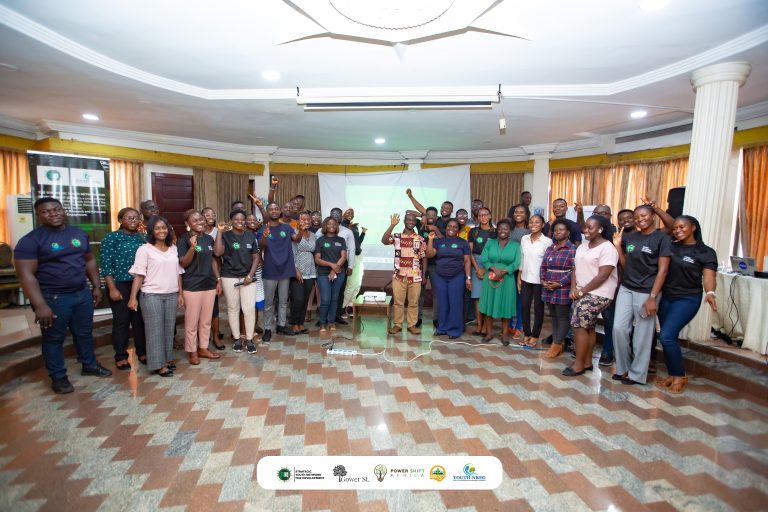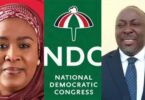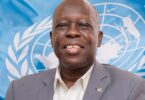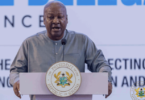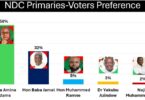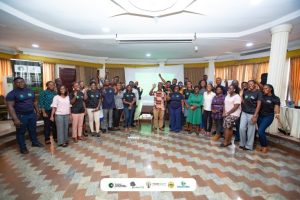
Story by: Ishmael Barfi
As the country prepares for its Presidential and Parliamentary elections next year 2024, young people have been tasked to demand the manifestos of political parties to ascertain its sensitivity towards climate and environment-related issues.
This according to Dr. Antwi Boasiako Amoah would enable them to make contributions concerning climate-related issues.
To him, there is a need for young people to be engaged and involved in the formation of manifestos of political parties.
“They need to be involved because they are the future leaders. And therefore, if problems are created today, the implications are going to be their responsibility to clean them up. That’s why they need to be involved”.

Dr. Antwi Boasiako Amoah, Acting Director, of the Climate Change Unit, EPA
Dr. Antwi Boasiako Amoah who is the Acting Director, of the Climate Change Unit, Environmental Protection Agency (EPA), Ghana gave this task to the young people at the launch of the National Youth in Leadership and Adaptation project held on 8th November, 2023 in Accra.
The project is one of the flagship projects of Strategic Youth Network for Development-Ghana (SYND), a youth-driven organization in the climate change space in Africa.
Elaborating on the subject, he stressed there is a need for political parties to involve young people in their decision-making process, to be part of the ongoing consultations, and to be part of the ground activities that are happening.
“So that the designs, the architecture of it will have the input of the young people in this process”, he added.
In that regard, “I am challenging them to be straightforward with politicians, especially the political parties to demand for their political manifestos. How sensitive those manifestos are with climate or environment-related issues because climate change is affecting the order of the day”
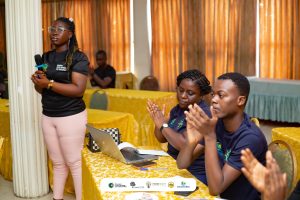
Cross Section of participants
The Acting Director of the Climate Change Unit at EPA indicated, “Everything that we are doing today, the farmer, the fishermen, the academic programs, all are being affected by climate change, and therefore if they are going to lead tomorrow then they have to ask the leaders today, what are the agenda for this particular problem?”
Touching on numerous projects the government is doing, he acknowledged the efforts of the government in providing schools and roads among other infrastructure projects, he was of the view of how sustainable are these projects.
He questioned whether these projects are conceptualized, whether these projects take into consideration the impact and implications of the rising temperatures, take into consideration the amount of volume of water that is going to come as a result of the project, what room for changes, and other considerations.
Citing the construction of a school building, he indicated that, though the construction of a school is to support young people to learn, the unavailability of enough windows hence ventilation, heat is going to be overwhelming that, “the children will be sitting in the classroom sweating, the teacher will be very uncomfortable, therefore learning will be affected negatively”.
“So the thinking is that we are doing development, we are doing projects, but let us take time and then also factor in a climate element”, he advocated.
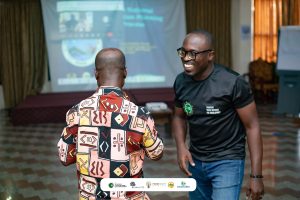
Deputy Executive Coordinator-SYND Solomon Yamoah (black T-Shirt) interacting with Dr. Antwi Boasiako
Though climate change element makes projects more expensive, which ideally overshoot government costs, he pointed out that “sometimes it is done in a hasty manner that, some of them are not durable. And this is what we want to talk about as experts on the field”.
Citing the one village one dam initiative which was to support prices in agriculture activity so that farmers can be farming all year round, hence a good project, he was quick to ask “How was it constructed? How much technical input went into it in terms of doing this very innovative agenda to support climate change adaptation? So the development has been ongoing. But how sustainable it is”.
He however believed that the inclusion of young people in the climate space in these mentioned projects would have given value for money as well as contributed to the country’s effort in addressing the numerous climate change issues.
Meanwhile in terms of support, financially, at the national level, he was of the view that it is not impressive, stressing that, Ghana has not made any conscious effort to fund adaptation activities apart from those that the international communities come up with.
“There have been projected adaptation activities, but how can we program these things in our national planning process? That’s where we are now”, he said.
Noting that prioritization is the best solution so “let release our activities based on our resources available. We are a poor country, we are a developing country, we don’t have much money, and therefore we need to prioritize what we think is affecting our livelihood so much. So if we want to solve the problems, we’ll prioritize them, make budget available, and then execute it”.
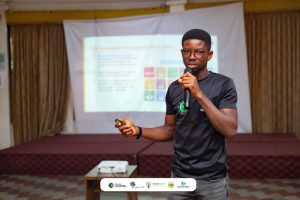
Co-Lead, National Youth in Leadership & Adaptation Project, Sarfoh Danquah
Speaking to the relevance of the project, the Co-Lead of, the National Youth in Leadership & Adaptation Project, Sarfoh Danquah explained that, the project aims to identify how young people can be fully engaged in the climate adaptation policies that Ghana has as a country, already existing policies relating to climate adaptation.
This he said is to ensure that, “young people don’t just sit aloof, doing nothing while those things are being done for them, but they will be fully engaged and involved participating in what decision-makers have come up with and also make sure that when new ones are coming up, they will be part of the designing, the formulation, and the implementation of these policies”.
Adding “Young people are the future leaders so there is the need to engage them on issues such as climate change, adaptation relating to their environment, development and growth, so no matter where they are, even if they are not climate scientists or environmental sciences.
The pilot project is expected to run for a year and SYND intends to continue after the one-year piloting as a way of empowering young people with knowledge on climate adaptation to enable them to interact, and question policymakers, and government on national policies and projects, hence value for money and addressing the numerous climate change challenges in the country.
Source: www.thenewindependentonline.com


